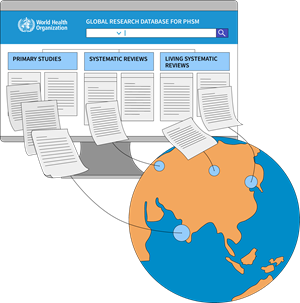WHO is launching a repository of multilingual, multidisciplinary, multisectoral research articles on public health and social measures (PHSM) called the PHSM Bibliographic Library. This is part of the WHO’s initiative on measuring the effectiveness and impact of public health and social measures (PHSM) during health emergencies.
The PHSM Bibliographic Library is updated through automated and manual searches across multiple electronic databases, preprint repositories, trial registries and other sources. It is designed to meet the diverse needs of users at all experience levels, providing an advanced search interface for efficient information retrieval. This interface includes functionalities such as filters aligned with the WHO PHSM conceptual framework and an extensive controlled vocabulary. Furthermore, the library offers data export options in multiple formats to facilitate saving and sharing of results, as well as a dashboard interface, offering insightful visualizations of indexed PHSM research.
The PHSM Bibliographic Library is the first in the series of three interconnected tools of the PHSM Knowledge Hub. The other tools are the PHSM Research Atlas and the PHSM Living Systematic Reviews.
The PHSM Research Atlas will offer insights into existing knowledge and gaps across research priority themes, intervention categories and diseases. Research articles in the Bibliographic library will be mapped against WHO’s PHSM conceptual framework and global research priorities 2021-2030. This enables monitoring the progress and gaining a comprehensive understanding of the evolving landscape of global PHSM research.
The PHSM Living Systematic Reviews, an AI-powered platform for users to gain timely insights into emerging trends and questions related to the effectiveness, adherence to and impact of PHSM.
These three interconnected tools will form the PHSM Knowledge Hub, a publicly accessible gateway to research and resources, facilitating the utilization of global multidisciplinary, multisectoral knowledge and fostering an understanding of effectiveness, unintended consequences and implementation strategies for PHSM.
For more information about WHO’s efforts in strengthening PHSM, please visit the WHO’s Initiative on measuring the effectiveness and impact of PHSM during health emergencies page.











